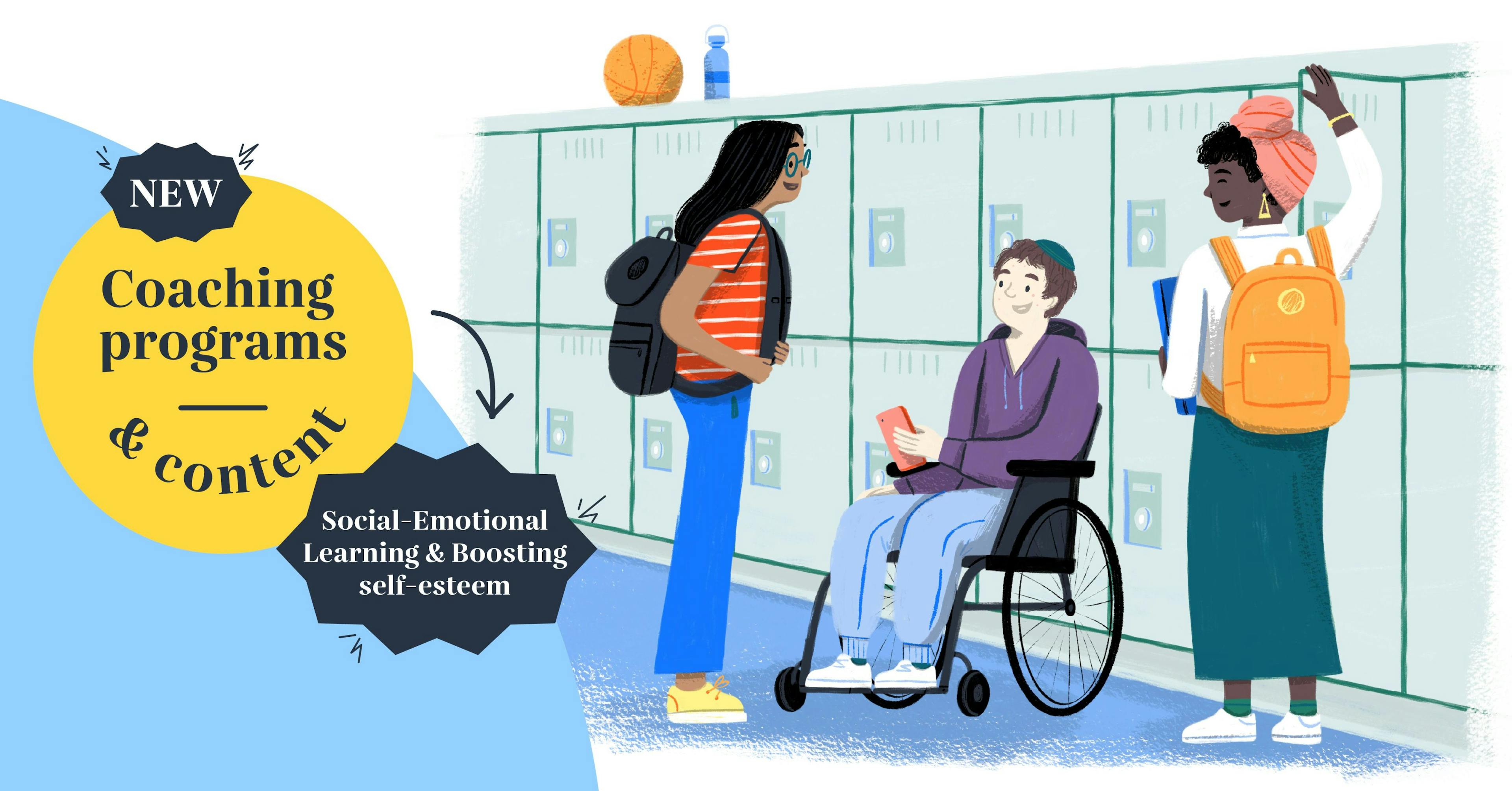Tips & support to help tackle Social-Emotional Learning and self-esteem issues for kids and teens

By Brightline team, Nov 5, 2021
School, activities, and sports are in full swing (and so is your part-time job as a chauffeur). While you probably cautiously welcomed a chance to send your kid back to the classroom, you may be noticing they’re struggling to adjust. Maybe your kid is battling anxiety about making friends or your teen is overwhelmed by the academic and social demands of high school.
That’s all totally normal. Being away from in-person school for so long was hard on kids and teens — and we don’t just mean their math grades. “School isn’t just about academics,” says Dominica Fox-DeMarco, NBC-HWC, a Brightline behavioral health coach. “In the classroom setting, kids and teens also learn important things like emotional regulation, social skills, and self-confidence.”
Our newest coaching programs — Social and self-awareness and Boosting self-esteem and confidence — and paired Connect resources can help fill in the gap, so your kid or teen can learn the skills they need to thrive at home and at school.
Social and self-awareness
Feeling all the feels is overwhelming in general, but navigating tough times is way harder if you don’t know how to name or communicate those feelings. That’s where Social-Emotional Learning (SEL) comes in.
In little kids, difficulty with self awareness may look like outbursts and tantrums, while older kids and teens may experience anxiety or panic attacks, or even withdraw from their normal activities. Either way, kids’ and teens’ emotions go hand in hand with their social lives, says Brightline behavioral health coach Charlene Montgomery, MS. “If kids or teens are having a tough time understanding and regulating their feelings, they may also struggle with communication and conflict,” she says.
Our new coaching program, Social and self-awareness, can help with both, equipping kids and teens to identify, understand, manage, and express their feelings. With a Brightline behavioral health coach, your family will gain tools for stopping those overwhelming emotions from taking over, then will work through coping skills to prevent them — think stress management, effective communication, listening, and managing conflict appropriately.
“We’ll get to the heart of the social and emotional skills your child or teen struggles with, then build those skills so they can understand their feelings and how they impact their relationships,” says Montgomery.
Boosting self-esteem
After way too many months at home, we’re all a little unsure of ourselves these days. Low self-esteem is especially common for kids and teens, who missed out on some crucial confidence-building opportunities at school. Maybe you can’t convince your little kid to try new things, your pre-teen’s constantly comparing themselves to others, or your high schooler’s perfectionism is getting out of hand.
Behavioral health coaching can help your kid or teen identify their unique strengths and values so they can tap into what they’re amazing at — and cope with feelings of low-self worth when “thought bullies” come creeping in. We’ll also help your kid or teen set goals for applying those skills and values, stay in tune with their feelings and needs so they can set healthy boundaries, and develop basic mindfulness skills that can help manage stress and overwhelm. “The goal is to empower kids with an understanding of what they have to offer and cope with the thoughts and feelings that interfere with their confidence,” says Fox-Demarco.
Think of coaching as a starting point to meet your goals. If at any point you or your coach feels like your kid needs more emotional support than goals and tools, we can connect you with a Brightline therapist who specializes in diagnosing and treating behavioral health issues.
Working on it at home
There are plenty of ways you can boost your kid or teen’s social and emotional awareness and self-esteem. Montgomery suggests caregivers help their kids identify their emotions as they’re happening — without stepping in to correct them. If your five-year-old is losing it after you turn off the TV, you could say, “Your yelling tells me you seem to be frustrated right now.”
Take a step back for a deep breath if you find yourself getting heated, and when you’re both calm, talk through the emotion and healthy ways to express it. For example, you could say “It’s so hard to be frustrated, but it’s not OK to scream or hit. What do you think we can do instead?”
If you’re noticing your child or teen struggling with confidence, Fox-DeMarco suggests incorporating mindful journaling into your family routine. Grab a notebook and sit down with your little kid or encourage your older kid or teen to journal solo with one of our newest digital exercises, the “Self-Esteem Journal”. Responding to basic prompts like “Something good that happened to me today was…” or “Something I can do to make tomorrow a better day is…” are simple-but-powerful ways to identify strengths and instill gratitude.
Need some support?
Looking for some help with social and self-awareness or self-esteem? Get started today with the Connect resources and coaching programs that are right for your child (or children’s) age.
We know how hard it can be to ask for help, but enlisting the support of an expert who has your back will pay off — for you and your kid alike. “We as parents think we have to have the answers ourselves, which can make us hesitant to reach out,” says Montgomery. “But reaching out isn’t just OK, it’s necessary. It’s a way to be mindful of ourselves as individuals and what our children need from us.”
Sign up for a free Connect account and explore relevant coaching programs for your family here > hellobright.co/2ZXVta9